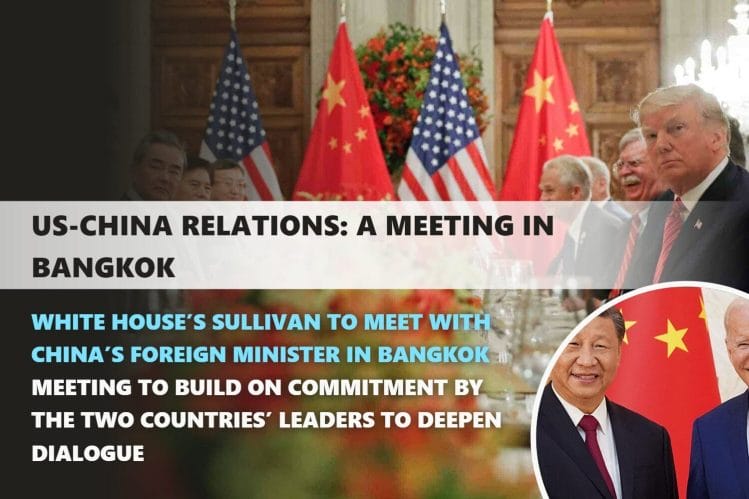US National Security Advisor Jake Sullivan is set to meet with Chinese Foreign Minister Wang Yi in Bangkok. This meeting is a continuation of the commitment made by the leaders of the two largest economies in the world to deepen their dialogue.
Are the tides changing in the tempestuous seas of global politics? As the US National Security Advisor Jake Sullivan prepares to meet with Chinese Foreign Minister Wang Yi in Bangkok, the world watches with bated breath. This meeting, a progression from the discussions that took place between US President Joe Biden and Chinese President Xi Jinping, is a clarion call for strategic dialogue between the leading economic powerhouses.
In November 2023, the Woodside Summit marked a turning point with Biden and Xi agreeing to enhance communication, resume military dialogue, and tackle issues like fentanyl production. Despite the consensus on various fronts, the Taiwan question lingered, unresolved and contentious.
The summit was more than a diplomatic formality; it was a rekindling of direct discourse at the highest level with the establishment of a presidential hotline signaling renewed commitment to engage and possibly defuse rising tensions.

The upcoming Bangkok meeting is not an isolated engagement. It represents a nuanced approach to diplomacy, involving direct and high-level conversations aimed at responsibly managing the complexities of the US-China relationship. Adrienne Watson’s statement underscores the strategic importance of these discussions and their potential impact on global stability and prosperity.
Read: CIA Director to Discuss Gaza Hostage Deal with Global Leaders
But the significance of Sullivan’s visit to Bangkok extends beyond US-China relations. His meetings with Thailand’s Prime Minister Srettha Thavisin and Deputy Prime Minister Parnpree Bahiddha-nukara are just as consequential. They symbolize the enduring relevance of the US-Thailand treaty alliance, fostering opportunities to solidify bilateral ties and address pressing global issues.
Now, as the world evolves before our eyes, we must ask ourselves: What practical steps can be taken to navigate this labyrinth of international relations? Let’s delve into “Our Recommendations” – a compass pointing towards proactive engagement in this new era of diplomacy.
Our Recommendations
- Embrace Multilateral Engagement: Countries like Pakistan must observe and learn from this unfolding US-China dialogue. A multilateral approach, not just bilateral engagements, can pave the way for a more interconnected world.
- Strengthen Regional Alliances: For nations within the Asia-Pacific region, this is the time to reinforce regional coalitions. Cooperation in areas like trade, climate change, and security can act as buffers against the currents of superpower frictions.
- Economic Diversification: Economic resilience comes from diversification. With trade wars looming between superpowers, countries must tap into alternative markets and form trade pacts that reduce dependency on a single economy.
- Cultivate Digital Diplomacy: In the digital age, diplomatic efforts must evolve. Harnessing social media and digital platforms for policy advocacy and public diplomacy can foster transparency and understanding among nations.
- Invest in Research and Education: Understanding the global economic landscape requires investment in education. Fostering a deeper understanding of international relations and economics among future leaders is imperative.
- Pursue Balanced Foreign Policy: A balanced foreign policy enables countries to navigate the complexities of international relations without being overly reliant on one partnership. It’s crucial for maintaining sovereignty and economic stability.
- Promote Peaceful Conflict Resolution: The US-China dialogue on maintaining open communication channels is a lesson in peaceful conflict resolution. Adopting similar strategies could mitigate regional tensions.
- Encourage People-to-People Ties: Beyond government talks, encouraging cultural exchanges and academic collaborations can build bridges and improve mutual understanding between nations.
- Foster Transparency in International Deals: Transparency is critical in international agreements. It builds trust among nations and ensures mutual benefits are realized and respected.
- Prepare for Future Implications: Lastly, with superpowers redefining their roles on the global stage, nations must prepare for the ripple effects these changes will bring. Being proactive rather than reactive is the way forward.
In conclusion, the Bangkok meeting between the US and China is more than a mere diplomatic rendezvous; it is a beacon for the intricate ballet of international diplomacy. It signals the possibility of tempering the rivalry that defines our age. Through careful observation and strategic action, countries worldwide can find their footing in this evolving dance of geopolitics. Engaging, learning, and adapting will be paramount for nations seeking to charter a course through these turbulent but transformative times.
What’s your take on this? Let’s know about your thoughts in the comments below!












